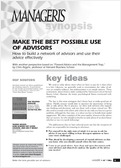Why do we give and get so much bad advice?

The advice that we are spontaneously led to give in a business organization is often of little relevance. How can we improve on the effectiveness of our advice?
We give or receive advice every day on various subjects, e.g.: how to solve a problem, pursue objectives, improve our performance, etc. Unfortunately, observation shows that most of this advice is ineffective, insofar as it concerns major changes in behavior.
Subconscious defensive reflexes often lead us to give inappropriate advice.
– We need to control situations. This leads us to conceive advice unilaterally. Similarly, we feel we should be convincing, which makes us hide any doubts we may have about the quality of our advice. These reflexes, however, deprive us of the opportunity to test our assumptions. So we end up giving flawed advice.
– We generally try to protect others. This causes us to give biased or ambiguous advice.
Advice is often poorly applied, despite the good intentions of those who receive it.
Even when we really want to implement advice, we don’t necessarily show this in our behavior. In stressful situations, psychological mechanisms often subconsciously cause us to revert to old habits.
We must work in two directions to make advice more effective:
– We must learn to be more open about our doubts and express our real thoughts without hurting others. This is indispensable to giving effective advice.
– Our advice must cover the root causes of counterproductive behavior, not just the behavior itself.
SubscriberSign in
to download
the synopse (8 p.)
VisitorI want to buy
this synopsis (8 p.)
VisitorI want
to subscribe
See also

Consultants: What’s the point?
How can you develop your ability to secure good advice?


